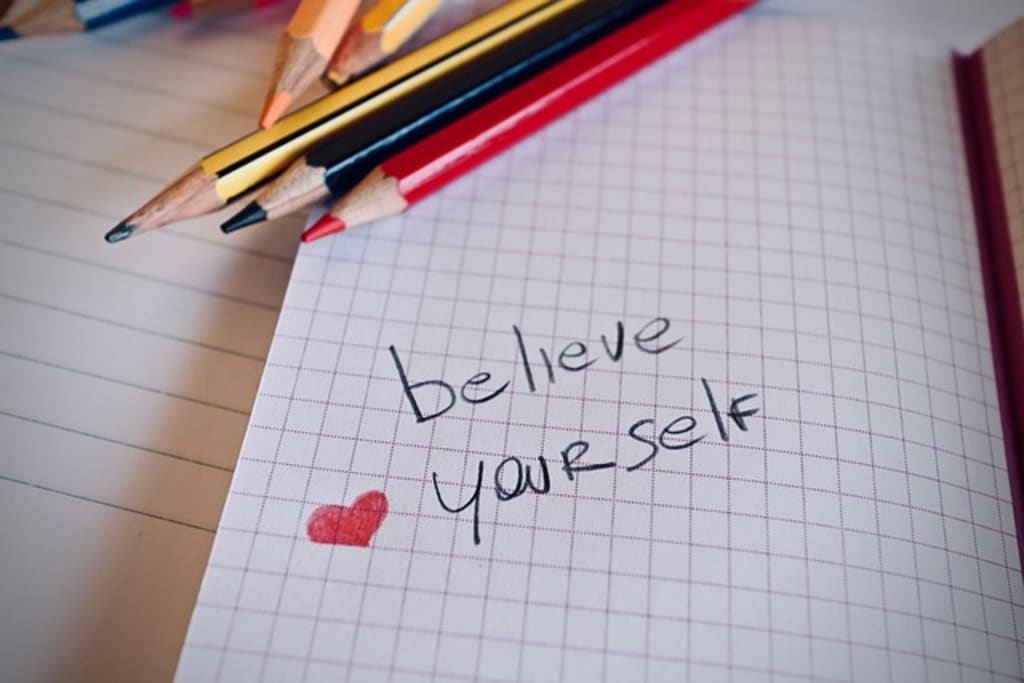
The belief in one's own abilities, skills, and judgment is referred to as self-confidence. It is the certainty that a task or goal will be completed successfully.
Self-esteem is one's overall assessment of oneself. It includes one's feelings about oneself, as well as one's strengths, weaknesses, and values.
The unwavering belief in oneself and one's abilities are referred to as self-belief. It is the belief that one can accomplish one's goals and overcome obstacles.
The intrinsic value one places on oneself is referred to as self-worth. It is the conviction that one is worthy of love, respect, and happiness.
The feeling of uncertainty, anxiety, or self-doubt about oneself or a situation is referred to as insecurity. It can be caused by a variety of factors, including past experiences, societal pressures, or internal negative self-talk.
A healthy sense of self-confidence and self-esteem is essential for personal development, fulfilling relationships, and achieving life success. It enables people to face challenges and setbacks with resilience, take risks, and pursue their dreams without fear of failure.
Understanding Insecurity
The feeling of uncertainty, anxiety, or self-doubt about oneself or a situation is referred to as insecurity. It is frequently accompanied by a lack of self-esteem and confidence.
Here are some examples of insecurity in various contexts:
Work: feeling insecure about one's job performance, being underqualified for a position, or being intimidated by colleagues
Relationships: feeling insecure about one's partner's feelings or actions, fear of rejection, or feeling inadequate for one's partner
Feeling insecure about one's appearance, social skills, or ability to fit in with a group in social situations
Insecurity can have a significant negative impact on one's life.
Insecurity can result in:
Avoidance of new experiences and opportunities
Excessive worrying and overthinking
Self-criticism and negative self-talk
Relationships are difficult to establish and maintain.
Stress and anxiety levels have risen.
Depression and low self-esteem are symptoms of poor mental health.
To avoid the negative effects that insecurities can have on one's life, it is critical to recognize and address them. Individuals can begin to overcome their insecurities and build confidence and self-esteem by understanding the root causes of insecurity and practicing self-compassion and self-care.
Building Self-Esteem
Self-esteem is one's overall assessment of oneself. It includes one's feelings about oneself, as well as one's strengths, weaknesses, and values. Self-esteem development entails taking steps to cultivate a positive self-image and a healthy sense of self-worth.
Here are some suggestions for increasing self-esteem:
Practice positive self-talk: Replace negative self-talk with positive affirmations. Concentrate on your accomplishments and strengths.
Set attainable goals: Divide larger goals into smaller, more manageable steps. Celebrate each milestone along the way.
Self-care entails taking care of one's physical, emotional, and mental health. Exercise on a regular basis, eat a nutritious diet and get enough sleep. Make time for your favorite hobbies and activities.
Surround yourself with positive people: Surround yourself with people who will encourage and support you. Stay away from toxic relationships and negative influences.
Concentrate on your strong points: Determine your strengths and capitalize on them. Improve your skills in areas where you want to be better.
Small victories must be celebrated in order to build self-esteem. Recognizing and celebrating small victories helps to maintain momentum and provides motivation to work toward larger goals. It also reinforces the belief that one is capable of achieving their objectives, resulting in a greater sense of self-worth and confidence. Individuals can improve their overall quality of life and achieve greater success in their personal and professional endeavors by taking steps to increase their self-esteem.
Building Self-Confidence
The belief in one's own abilities, skills, and judgment is referred to as self-confidence. It is the certainty that a task or goal will be completed successfully. Building self-confidence entails overcoming self-doubt and developing a positive belief in oneself.
Here are some suggestions for increasing self-esteem:
Confront your fears: Identify the sources of your anxiety or fear and confront them head-on. Begin with small steps and progress to larger challenges.
Self-compassion means treating yourself with kindness and understanding. When things don't go as planned, don't be too hard on yourself.
Develop a growth mindset: Accept the notion that your abilities and skills can be improved with hard work and dedication. Concentrate on progress rather than perfection.
Surround yourself with positive influences: Surround yourself with people who believe in you and want you to succeed. Stay away from negative influences and toxic relationships. Experiment with new things and take risks outside of your comfort zone. Accept uncertainty and learn from your mistakes.
Getting out of one's comfort zone is critical for developing self-confidence. Individuals can build resilience, develop new skills, and gain a greater sense of self-assurance by taking on new challenges and pushing past their limits. While stepping outside one's comfort zone can be intimidating, it can also lead to new opportunities and experiences that will enrich one's life. Individuals can overcome self-doubt and achieve greater success in their personal and professional lives by taking steps to build self-confidence.
Overcoming Insecurities in Relationships
In relationships, insecurity refers to feelings of doubt, uncertainty, or anxiety about oneself or one's partner. It can cause jealousy, possessiveness, and a lack of trust, straining the relationship.
Relationship insecurity can be caused by a variety of factors, including:
Rejection or betrayal in the past
Self-esteem or self-worth issues
Communication problems
Concerns about trust
Personal issues that have yet to be resolved
Here are some suggestions for dealing with relationship insecurity:
Open communication: Discuss your feelings and concerns with your partner in an open and honest manner. Listen actively to their point of view and collaborate to find solutions.
Set clear boundaries with your partner, and respect each other's space and independence. This can aid in the development of trust and the reduction of feelings of insecurity.
Trust is essential for the development of a healthy relationship. Trust your partner and give them the benefit of the doubt until they prove otherwise.
Concentrate on the present: Don't let past experiences or future fears affect your relationship. Keep your attention on the present moment and enjoy your time with your partner.
Address any personal issues that may be contributing to your feelings of insecurity. Seek professional assistance if necessity. It takes time and effort from both partners to overcome insecurity in relationships. Individuals can overcome insecurities and build stronger, healthier relationships with their partners by practicing open communication, setting boundaries, and practicing trust.
Conclusion
Developing self-confidence and overcoming insecurities are critical for personal development and success. A healthy sense of self-esteem and confidence can lead to improved relationships, increased resilience, and greater success in personal and professional endeavors. Overcoming insecurities, whether they are the result of previous experiences, relationships, or personal issues, necessitates deliberate steps toward positive self-talk, self-care, and self-compassion.
Making self-improvement a consistent practice is essential for maintaining a healthy level of self-confidence and self-esteem. Seeking professional assistance, practicing positive affirmations, and setting attainable goals are all examples of this. Small victories along the way can help to reinforce positive changes and build momentum toward increased self-confidence.
Remember that developing self-esteem and confidence is a process that takes time and effort. It is critical to be patient with oneself and to accept that setbacks will occur. However, with dedication and a willingness to challenge oneself, insecurities can be overcome and a strong sense of self-assurance can be developed.
FAQ
1. How do I stop being insecure and build confidence?
To overcome insecurity and gain confidence, it is necessary to confront negative thoughts, practice self-care, and step outside of one's comfort zone. Seeking professional help, practicing positive self-talk, setting attainable goals, and celebrating small victories can all contribute to this.
2. How do I get rid of insecurity in my body?
It is critical to practice self-acceptance and self-love in order to overcome body insecurity. Focusing on one's strengths, engaging in regular exercise and healthy eating habits, and surrounding oneself with positive influences can all contribute to this.
3. How to overcome low self-esteem and insecurities in a relationship?
To overcome low self-esteem and insecurities in a relationship, open communication, clear boundaries, and trust must be practiced. It may also entail addressing any personal issues that may be contributing to one's insecurities and, if necessary, seeking professional help.
4. How to become more confident?
To gain confidence, one must challenge negative self-talk, practice self-compassion, and step outside of one's comfort zone. Seeking feedback from others, practicing public speaking or socializing, and setting attainable goals are all examples of this.
5. What are women's biggest insecurities?
Body image, relationships, career success, and aging are some of the most common insecurities among women. It is critical to confront these insecurities with positive self-talk and self-care practices, as well as seek support from trusted friends, family, or professionals as needed.
6. How do I love myself?
Self-care, self-acceptance, and self-compassion are all aspects of loving oneself. This can include focusing on one's strengths, engaging in enjoyable activities, setting boundaries with others, and seeking professional assistance if necessary.
7. How do you fix a woman's insecurity?
Fixing a woman's insecurity requires a joint effort from the woman and her partner, as well as any necessary professional assistance. This can include using open communication, establishing clear boundaries, and providing support and encouragement.
8. How can you tell if someone is insecure?
Insecure people may exhibit behaviors such as excessive self-doubt, fear of rejection, and a proclivity to seek validation from others. They may also avoid situations in which they feel vulnerable or uneasy.
9. What medication is good for self-esteem?
Medications alone are rarely used to treat low self-esteem. Certain medications used to treat depression or anxiety, on the other hand, may improve self-esteem indirectly as a result of improved mental health.
10. Is self-esteem a mental disorder?
Self-esteem isn't a mental illness. It is a normal aspect of one's personality that can be influenced by a number of factors including upbringing, experiences, and personality traits. Low self-esteem, on the other hand, can contribute to mental health issues such as depression and anxiety.
https://www.radafacts.com/2023/04/how-to-build-self-confidence-and-overcome-insecurities.html
#selfconfidence #selfesteem #selfbelief #selfworth #insecurity #buildingconfidence #buildingselfesteem #buildingselfconfidence #insecuritiesinrelationships #communication #selfacceptance #selflove #selfcare #mentalhealth #positiveselftalk #growthmindset #comfortzone #personaldevelopment #womenempowerment #bodypositivity #successmindset #mindfulness





Comments
There are no comments for this story
Be the first to respond and start the conversation.